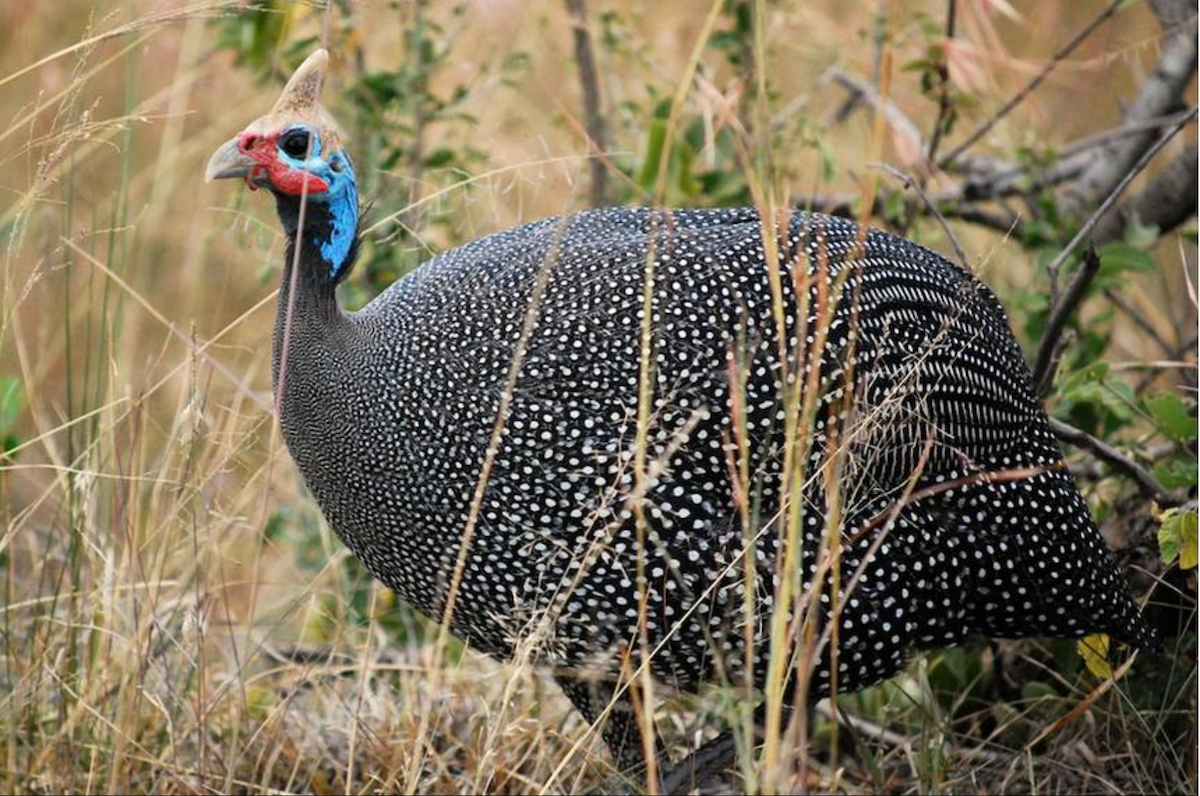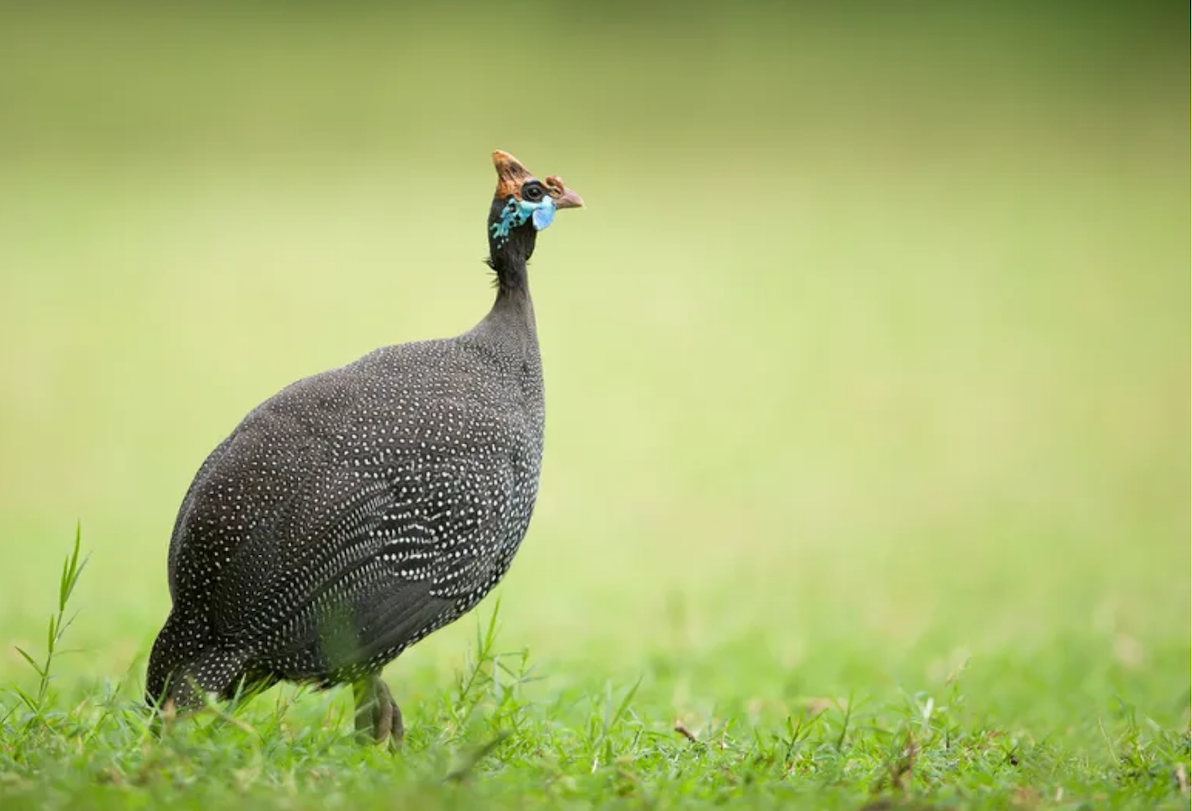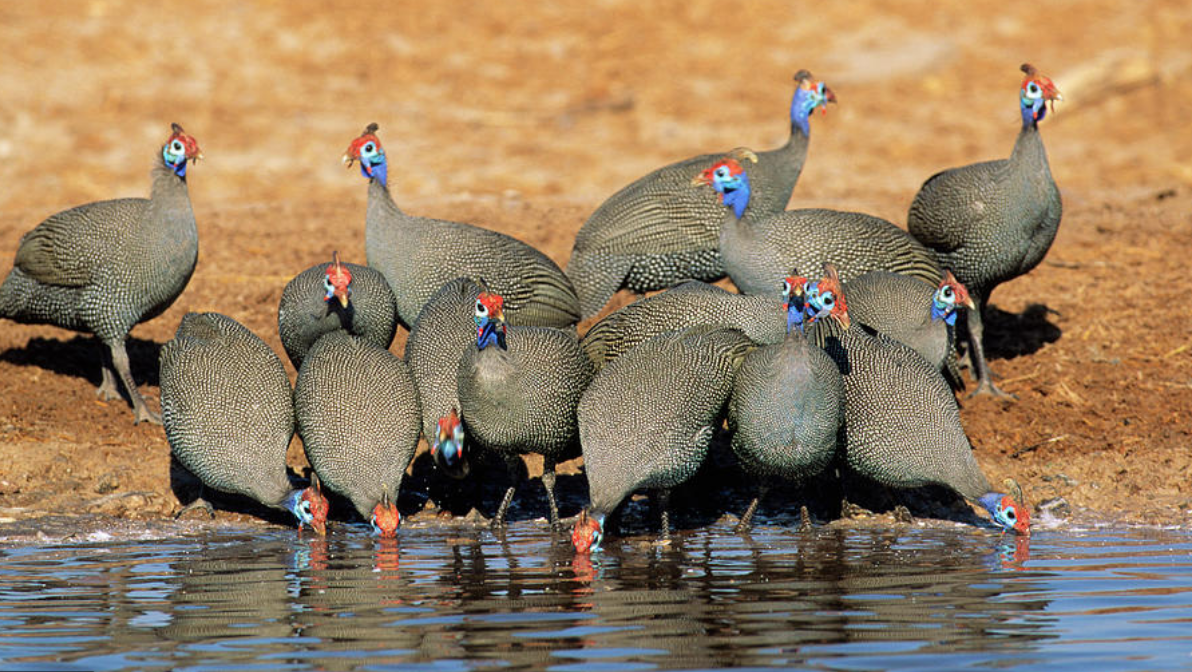Guinea Fowl – Tick Assassins!
By Teresa Burton
Known by a few names, such as African Pheasant and Guinea Hens, one could also call this African native the “Tick Assassin.” In fact Ticks are one of the Guinea fowls favourite treats!
Homeland
In their African homeland, these loud and prehistoric-looking fowl follow around the grazing herds and reportedly eat up to 4000 ticks a day. This could provide an ecological solution to the tick problems around herds of horses and cattle. This is also an important asset for human and pet health too.
Guinea fowl
These birds are relatively low maintenance. In the summertime, they will forage all of their food. They eat ticks, fleas, crickets, mosquitos, slugs, grasshoppers and small rodents (basically anything they can get their beaks on) without destroying the yard or garden as chickens do. Flocks of guineas have been known to eat snakes. They also love to eat weeds. A bit of feed in the coop will encourage them to come home at night. If you are encouraging to be with your Lusitanos your flocks will find homes high in treetops, away from the threat of predators.
Naturally Healthy
They are also free from most diseases that plague other poultry. They will give warning calls when unknown guests arrive, which helps to protect other farm animals. In the farmyard their call will also keep unwanted rodents away.
Guinea fowl manure can be added to your compost and is a wonderful addition to nurturing the soil where your food is grown. Your plants will thrive.
Guineas are known for their hardiness, being able to withstand both hot and cold.
While not laying as often as chickens, guinea eggs may still be collected and eaten. Guineas tend to make their nests in hidden areas, so finding their eggs may be an adventure.
Speaking from my own personal experience there are Guinea Fowl at the farm and I have to say that there is a noticeable decrease in ticks on our horses – in fact we have found none at all! The Guinea fowl run daily patrols of the paddocks and stables leaving no area uninvestigated. They are amusing birds to have around providing plenty of entertainment, I cannot say I am at all bothered by their calls and nor are the horses. Who allow them to walk underneath their bellies dart out in front without a single spook of concern.
When starting your flock
it’s best to buy them from keets (babies) so they will know where home is, buy your keets from a reputable source. If you have nearby neighbours, it’s best to check in with them, as their squawking can be unbearable for some. However, given their reputation as tick assassins, having them in the neighbourhood can be a helpful, healthy alternative to pesticides if you are living in a tick-ridden area.
The key is training your young birds to roost in trees if they are to remain out at night to avoid predators.
Bear in mind that guinea meat is also a known delicacy, so if you start your flock and someone complains, you start a business in specialist Guinea meat.
In the USA Guinea fowl have long been considered a prized game bird, right up there with pheasants and quail. Understandably, the Egyptians considered the guinea fowl a luxury food for the wealthy. Guineas are gaining in popularity, outselling their pheasant and quail friends.
I have talked with many America Farmers and horse owners that have Guinea fowl to mange their tick populations and the opinion is universal –
Using Guinea fowl solves their tick problem.
President of the Guinea Fowl International Association Cindy Gibson
notes that using them to control ticks and other bugs is their truest claim to fame. Further evidence of guineas as pest control comes from her Lexington, Texas, farm which was once overrun by grasshoppers. After using “every pesticide known to man,” Gibson added some guinea fowl to her mix of llamas, donkeys and pigs and found the grasshopper problem was miraculously solved. “I’ve been a fan ever since.”
The Better Option
In Africa Guinea Fowl are being promoted as a better option to rearing chickens as are easier to manage by resource-poor farmers. Many of the farmers have poor conditions and hardly any access to formal veterinary services so these birds service better because they are resistant to most poultry diseases.
The World Bank
has been supporting guinea fowl farmers in Ghana under the West Africa Agricultural Productivity Program (WAAPP) capacitation framework. Under this programme, guinea fowl population in Ghana now accounts for about 7 percent of the national poultry population and farmers in northern Ghana obtained more income from the guinea fowl than from chicken, which highlights opportunities for further growth and effective commercialisation.
The Future
It is not looking like any time soon governments will change the ruling in the piroplasmosis regulations for import and export so maybe it is time we explored alternative solutions that could have the potential to take away the issue entirely. What´s more this is a biological solution that doesn’t involve putting chemicals on the animals or the land. I suggest that trials are carried out on farms with initial professional advise in introducing the Guinea Fowl to the herds, hatching methods and rearing keets (young birds). Now is the time for change.
Laern more about Piroplasmosis Understanding Piroplasmosis
Text By Teresa Burton. – Lusitano Heritage







